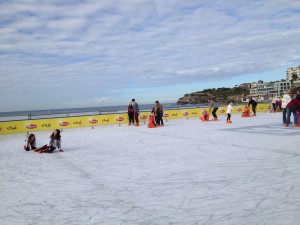This Morning when I went down to Bondi beach to do some exercise I was greatly amused to see in middle of the beach set up was an outdoor ice skating rink. Being from Montreal and seeing an outdoor ice skating rink is a fairly common occurrence in the winter and not all to exciting. Observing one on Bondi beach did get my attention. I had notice them setting the rink up over the last few weeks but it didn’t quit take me until now that I sow the rink fully finished and operational.
The ice skating rink is part of the annual Bondi winter magic festival which runs for about a month. During the festival there are music and food events as any festival would have, as well as one day where they had some giant inflatable whale, a clothing swap and off course ice skating.
I guess it would be interesting to ice skate outdoors while hearing, seeing and smelling the ocean but would I pay over $20 for less than an hour of ice skating, mind you it’s not even a full size rink. In Montreal I can walk a 5 minutes from our home to where there is a full size ice hockey rink with free skating almost every afternoon.
So it got me thinking about what compels people to want to ice skate on Bondi beach. I mean after all your standing in a beautiful place with awesome surfing, swimming, coastal walks, and even scuba diving. “But no, we’ve got to ice skate!” I guess it is exciting to try new activities and have new experiences, for novelty. I’m sure there will be Australians who will ice skate there for the first time in their life, and perhaps last time, or maybe not for a decade. Maybe there are people who ice skate once a year, every year at this on the beach rink?
But here’s the thing; Is it enjoyable to go ice skating only one time? I’d say no, because you’d spend the time holding on to the walls around the rink, slipping and getting wet, and your feet most likely will be uncomfortable in some off the shelf rented pair of skates. It takes at least a few times to get the hang of skating before you can begin to enjoy it. You could feel good though by telling your friends that you’ve been ice skating
Perhaps the same with surfing. No one goes out the first time in their life with a surf board, catches a wave and has an incredible time. More likely they spend their times on the beach standing on the surfboard, then get in the water and end up with a few mouthfuls of salt as waves crash in their face.
Perhaps it’s like this with most things in life, it takes time to really begin to enjoy an activity. As time progresses and we continue in the practice it opens itself to us and we experience something new. Take skydiving; Plenty of people have been skydiving, though I’d say that ninety nine precent have probably gone once in their lifetime and did no as tandem jump. This means they were connected with a professional. But think about it, what would the experience be like to jump solo where it is just you out on your own and no instructor attached to you. It would be totally different.
The day you’re able to skate forward backwards comfortably around an ice rink and stop when you want, you will enjoy it more than the first time were you spent slipping around and falling, banging your knees, elbows, and wrists.
It’s the same thing when it comes to studying Torah and doing mitzvoth, it takes time to get into it, and the longer one goes the more exciting it gets. The first time you try and study through a page of Talmud will be a struggle. You may be trying to just stay on your feet but with time when you can go forwards, backwards, and stop whenever you want it will be a whole new experience.
Read More








